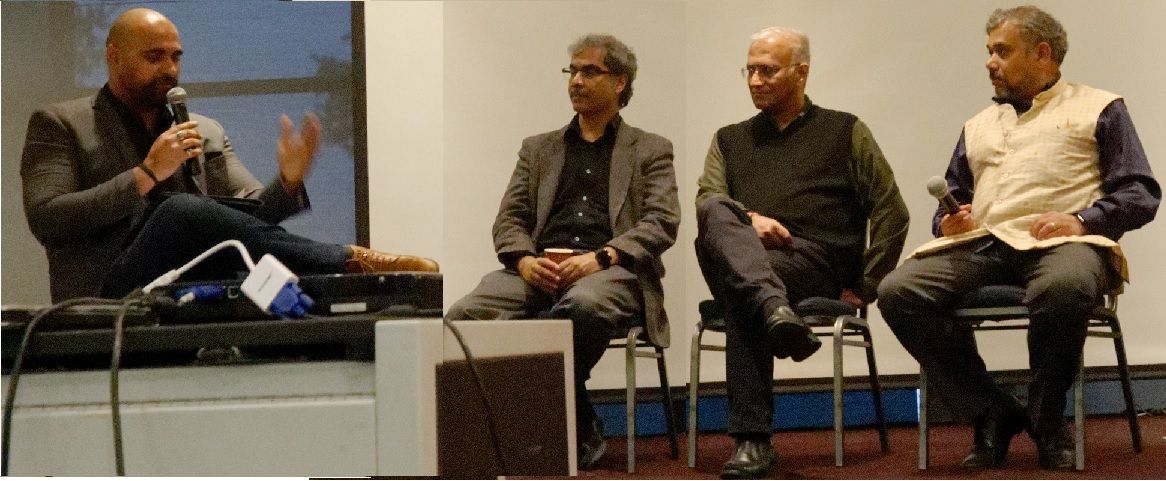
ELIZABETH CHALIER-VISUVALINGAM

CHICAGO: A good number of members of the Indian community braved wintry weather to gather at Balaji temple auditorium in Aurora, a south side suburb of Chicago, to celebrate Chicago’s first ‘Indic Day’ hosted by Indic Academy (IA), a global network of activist scholars and public intellectuals working toward a Hindu renaissance.
Four individual talks were followed by a panel discussion on “How can Indian values contribute to peace and prosperity in America?”
IA US coordinator Avatans Kumar, who blogs regularly on socio-political challenges facing Hindus, directly addressed the multiple determinants – national, regional, language and caste- and complexities of Indian identity from a diasporic perspective. He recalled bewildering contradictions, along his own itinerary from Bihar to Chicago, between lived experience as an upper-caste Hindu and self-images subsequently thrust upon him that he could eventually trace back to the “authoritative” writings of Indologists, both Western and Indian.
”We have the liberty to choose, negotiate and reconcile our identities” he said contrasting half-Indian presidential candidate Kamala Harris, who prefers to highlight her Afro-American background, to Anglo-Polynesian Tulsi Gabbard, who unabashedly affirms her Hindu faith.
Co-founder of Indian History Awareness and Research thinktank, Texas-based engineer Raj Vedam’s vocation is reinstatement of ancient Indian achievements, especially in sciences, against distortions and falsifications imposed by Hinduphobic Western scholarship. His “fresh look at evidence for ancient Indic prehistory” focused on politicization of identity.
Vedam began by showing street agitations in ‘Christian and independent’ Mizoram, led by its former chief minister, rejecting official findings there by the Archaeological Survey of India of ancient Hindu artifacts.
The discovery of the Kerala city of Muzaris, a putative port of entry of Saint Thomas, has been amply funded despite dubious methods used by an unqualified “Christian-Marxist nexus.
”Such threats to the (pre-) historic foundations of Hindu identity are thus coming not only from secessionist ethnicities on the peripheries but from the (erstwhile) political center itself,” Vedam said.
His primer- from multiple, linguistic and genetic perspectives – on the Aryan migration versus out-of-India scholarly controversy, underlined its continuing, likewise divisive, ideological and practical impact on the Indian national identity.
India Country Director of the Lakshmi Mittal and Family South Asia Institute of Harvard University, Sanjay Kumar. released and read excerpts from his book, From Katihar to Kennedy – A Road Less Travelled. His autobiographical narrative recounts an improbable journey against all odds from his “invisible existence” in the parochial backwaters of small-town Bihar through New Delhi’s Jawaharlal Nehru University to a generous scholarship at Harvard’s Kennedy School of Government.
Despite humble beginnings and repeated academic failures, being written off even by well-wishers, Kumar not only persevered in his quest for self-betterment through education but also worked for the empowerment of disenfranchised groups such as women through institutions such as Sewa Bharati. Harvard opened to his grateful eyes, though sensitive to the entitled snobbery of fellow students, a whole “new world” that is captured in his live encounter with Noam Chomsky. Kumar’s unlikely story will no doubt resonate with Indian immigrants who owe their successful lives to being in America.
Inspired by Swami Vivekananda (SV), Malaysia-born Sunthar Visuvalingam resettled in Banaras at age 19 to study Sanskrit and Indian philosophy. His theme of “Redefining Hinduism and Indian identity in the American diaspora,” delineated an ‘acculturation’ model of South Asian religions. Observing that the term ‘Indic’ embraced ‘indigenous’ ways of life while excluding ‘foreign’ ideologies, such as Islam, Christianity, and Western secularism, he argued that “our perennial tradition (sanatana dharma) had been constantly redefining itself through constructive dialogue with others”.
Rather, ‘Hinduism’ itself would be the cumulative result of the Brahmanical assimilation of the once dominant Buddhist challenge to Vedic scriptural authority.






